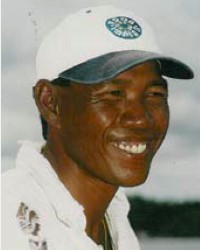Brunei Malay, Kedayan in Malaysia

Photo Source:
Copyrighted © 2026
Southeast Asia Link - SEALINK All rights reserved. Used with permission |
Send Joshua Project a map of this people group.
|
| People Name: | Brunei Malay, Kedayan |
| Country: | Malaysia |
| 10/40 Window: | Yes |
| Population: | 407,000 |
| World Population: | 607,300 |
| Primary Language: | Brunei |
| Primary Religion: | Islam |
| Christian Adherents: | 6.00 % |
| Evangelicals: | 0.30 % |
| Scripture: | Translation Started |
| Ministry Resources: | No |
| Jesus Film: | No |
| Audio Recordings: | No |
| People Cluster: | Malay |
| Affinity Bloc: | Malay Peoples |
| Progress Level: |
|
Introduction / History
The largest indigenous people in Brunei are the Kedayan and the Malay.
The Kedayan are Malay-speaking and Muslim agriculturalists. Despite their language and religious affiliations with the ethnic Malay majority, Bruneians regard the Kedayan as closer in status to the animistic, interior tribal groups because of a number of their similar cultural practices.
The sultan of Brunei rules under a national philosophy known as Malay Islamic Monarchy, which promotes Islamic traditions and values and loyalty to the sultan. The activities of political parties are severely restricted.
Where Are they Located?
The Kedayan are residing in Brunei, Labuan, Sabah, and parts of Sarawak on the island of Borneo.
Brunei is on the northern coast of Borneo, the world's third-largest island. All its land borders are with the Malaysian state of Sarawak, which splits Brunei into two parts. The landscape is mainly pristine equatorial jungle drained by small rivers. Most settlements are situated along estuaries. There are four districts in Brunei and the Kedayan live in two districts: Brunei-Muara (the capital district), and Tutong, (a center of oil and gas exploitation), in the western part of the country.
What Are Their Lives Like?
The Kedayan are agriculturalists and experts in making traditional medicines. They also have a reputation for specializing in medicinal plants which they grow to treat a wide range of ailments and to make tonics.
The wedding customs of the Kedayans are not much different from the indigenous Malay ethnic groups in Brunei. Men and women do not openly court each other. These days parents from both sides first meet each other especially during discussions which include sending a proper entourage to seal the formal engagement. Some examples of items that would be agreed for the engagement are a ring and dowry. After a feast, the couple will then return to the bride's residence. Gifts from the groom's family, mainly electrical appliances and groceries, will be given to the couple. The traditional and customary aspects of Kedayan weddings are gradually changing due to convenience, time, and inter-marriage between different ethnic groups.
What Are Their Beliefs?
The Kedayan beliefs include Islam, Animism, and ancestor worship.
The government of Brunei continues to ban many religious activities of non-Muslim groups, including those of indigenous peoples like the Kedayan. At the same time, the government permits or assists those of the Islamic authorities. These Islamic authorities organize proselytizing activities, which include incentives to indigenous peoples in rural areas such as financial aid, new homes, water pumps, etc. There is thus great pressure for indigenous peoples to convert from animism and ancestor worship to Islam, though a smaller proportion continues to convert to Christianity.
Animism is the worldview that non-human entities—such as animals, plants, and inanimate objects—possess a spiritual essence.
What Are Their Needs?
The Kedayan need to hear and believe the gospel. They need the chance to be confronted with the claims and the holiness of Christ.
Prayer Points
Pray that Christian broadcasts would reach seeking ears of the Kedayan.
Pray for the Bible to be translated into the dialect of the Kedayan people.
Pray that the Brunei government will allow Christian missionaries to openly share Jesus.
Pray that the Kedayan people group would accept the message of Christ and have the opportunity to grow in Him.